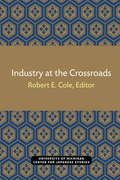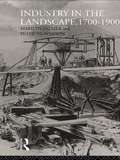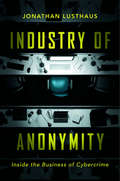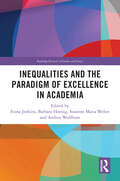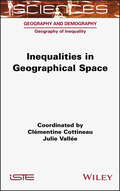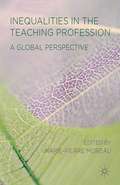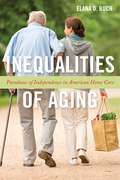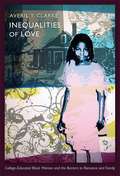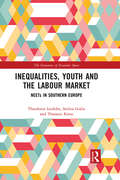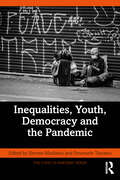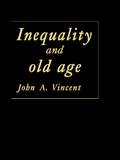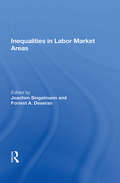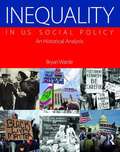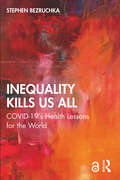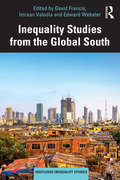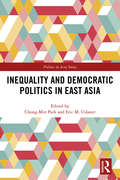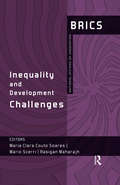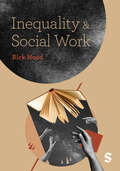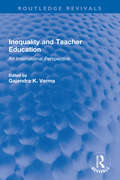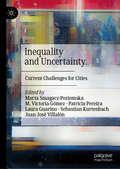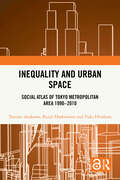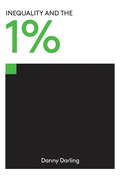- Table View
- List View
Industry at the Crossroads (Michigan Papers in Japanese Studies #7)
by Robert E. ColeIndustry at the Crossroads
Industry in the Landscape, 1700-1900 (History Of The British Landscape Ser.)
by Peter Neaverson Marilyn PalmerTwo hundred years of industry have transformed the British landscape. This book enables the reader to reconstruct the landscape of past industry. The authors are industrial archaeologists of national standing whose concern is to use surviving material evidence and contemporary sources to study the former working conditions of men and women. Comprehensive in coverage, the book examines fuels, metals, clothing, food, building and transport. It makes clear the tangible elements which form the basis for recreation of past landscapes and demonstrates both their function and the context in which they should be considered.
Industry of Anonymity: Inside the Business of Cybercrime
by Jonathan LusthausJonathan Lusthaus lifts the veil on cybercriminals in the most extensive account yet of the lives they lead and the vast international industry they have created. Having traveled to hotspots around the world to meet with hundreds of law enforcement agents, security gurus, hackers, and criminals, he charts how this industry based on anonymity works.
Inequalities and the Paradigm of Excellence in Academia (Routledge Research in Gender and Society)
by Fiona Jenkins, Barbara Hoenig, Susanne Maria Weber and Andrea WolfframThis volume examines the criteria of excellence producing inequalities of gender in the daily working environment and evaluation of academics. Policymakers have increasingly placed emphasis on gender equality as part of a strategy for achieving research excellence, and efforts to reduce gender bias have become mainstream. This book suggests that this goal has remained elusive in practice due to continuing under-representation of women across many academic and scientific fields. Questioning the old structures of male dominance still prevalent in national research policy, the book explores the effects of institutional values and practices on the careers of academics, particularly the academic identities of women and their career developments. It focuses on case studies drawn from Europe while also highlighting the rise of new forms of public management and a neoliberal framing of the value of academic work, that have a much broader global reach. Using participatory research, the book analyses contemporary forms of "gendered excellence" in an intersectional and international perspective. It will be of interest to junior/senior researchers, teachers, and scholars in sociology, education, gender studies, history, political science and science and technology studies.
Inequalities in Geographical Space
by Clementine Cottineau Julie ValleeInequalities are central to the public debate and social science research. They are inextricably linked to geographical space, shaping human mobility and migration patterns, creating diverse living environments and changing individuals’ perceptions of the society they live in and the inequalities that endure within it. Geographical space contributes to the emergence and perpetuation of inequalities between individuals according to their socioeconomic position, gender, ethno-racial origin or even their age. <p><p> Inequalities in Geographical Space examines inequalities in education, in the workplace, in public and private spaces and those related to migration. Written by geographers, sociologists and economists, this book draws on a variety of theoretical and methodological approaches and compares different spatial and temporal scales. It highlights the importance of geographical space as a vehicle for the expression, creation and reproduction of social, racial, economic and gender inequalities.
Inequalities in the Teaching Profession
by Marie-Pierre MoreauCountering the commonplace view of teaching as inclusive, this collection highlights the persistence of inequalities in the teaching profession. It explores the ways in which gender, ethnicity, social class and other identity markers shape teachers' experiences in a range of institutional and national contexts.
Inequalities of Aging: Paradoxes of Independence in American Home Care (Anthropologies of American Medicine: Culture, Power, and Practice #5)
by Elana D. BuchWinner, 2020 Eileen Basker Memorial Prize, given by the Society for Medical AnthropologyThe troubling dynamic of the American home care industry where increased independence for the elderly conflicts with the well being of caregivers Paid home care is one of the fastest growing occupations in the United States, and millions of Americans rely on these workers to help them remain at home as they grow older. However, the industry is rife with contradictions. The United States spends a fortune on medical care, yet devotes comparatively few resources on improving wages, thus placing home care providers in the ranks of the working poor. As a result, the work that enables some older Americans to live independently generates profound social inequalities. Inequalities of Aging explores the ways in which these inequalities play out on the ground as workers, who are disproportionately women of color and immigrants, earn poverty-level wages and often struggle to provide for themselves and their families. The ethnographic narrative reveals how two of the nation’s most pressing concerns—rising social inequality and caring for an aging population—intersect to transform the lives of older adults, home care workers, and the world around them. The book takes readers inside the homes and offices of people connected to two Chicago area home care agencies serving low-income and affluent older adults, respectively. Through intimate portrayals of daily life, Elana D. Buch illustrates how diverse histories, care practices, and social policies overlap and contribute to social inequality.Illuminating the lived experience of both workers and their clients, Inequalities of Aging shows the different ways in which the idea of independence both connects and shapes the lives of the elderly and the working poor.
Inequalities of Love: College-Educated Black Women and the Barriers to Romance and Family
by Averil Y. ClarkeInequalities of Love uses the personal narratives of college-educated black women to describe the difficulties they face when trying to date, marry, and have children. While conventional wisdom suggests that all women, regardless of race, must sacrifice romance and family for advanced educations and professional careers, Averil Y. Clarke's research reveals that educated black women's disadvantages in romance and starting a family are consequences of a system of racial inequality and discrimination. The author analyzes the accounts of black women who repeatedly return to incompatible partners as they lose hope of finding "Mr. Right" and reject unwed parenting because it seems to affirm a negative stereotype of black women's sexuality that is inconsistent with their personal and professional identities. She uses national survey data to compare college-educated black women's experiences of romance, reproduction, and family to those of less-educated black women and those of white and Hispanic women with degrees. She reports that degreed black women's lives include less marriage and sex, and more unwanted pregnancy, abortion, and unwed childbearing than college-educated white and Hispanic women. Black women's romantic limitations matter because they constitute deprivation and constraint in romance and because they illuminate important links between race, class, and gender inequality in the United States. Clarke's discussion of the inequities that black women experience in romance highlights the connections between individuals' sexual and reproductive decisions, their performance of professional or elite class identities, and the avoidance of racial stigma.
Inequalities, Youth and the Labour Market: NEETS in Southern Europe (The Dynamics of Economic Space)
by Theodoros Iosifides Stelios Gialis Thanasis KizosThis book thoroughly examines the socio-economic and labour market paths of young NEETs, particularly migrants and women, in the disadvantaged regions of Mediterranean Southern Europe – specifically, the island, coastal and peripheral areas of Greece, Cyprus, Italy and Spain.
Inequalities, Youth, Democracy and the Pandemic (The COVID-19 Pandemic Series)
by Simone MaddanuThis book brings together studies from various locations to examine the growing social problems that have been brought to the fore by the COVID-19 outbreak. Employing both qualitative, theoretical and quantitative methods, it presents the impact of the pandemic in different settings, shedding light on political and cultural realities around the world. With attention to inequalities rooted in race and ethnicity, economic conditions, gender, disability, and age, it considers different forms of marginalization and examines the ongoing disjunctions that increasingly characterize contemporary democracies from a multilevel perspective.The book addresses original analyses and approaches from a global perspective on the COVID-19 pandemic, its governance, and its effects in different geographies. These analyses are organized around three main axes: 1) how COVID-19 pandemic worsened social, racial/ethnic, and economic inequalities, including variables such as migration status, gender, and disability; 2) how the pandemic impacted youth and how younger generations cope with public health alarms, and containment measures; 3) how the pandemic posed a challenge to democracy, reshaped the political agenda, and the debate in the public sphere. Contributions from around the world show how local and national issues may overlap on a global scale, laying the foundation for connected sociologies. Based on qualitative as well as quantitative empirical analysis on various categories of individuals and groups, this edited volume reflects on the sociological aspects of current planetary crises which will continue to be at the core of our societies.A wide-ranging, international volume that focuses on both unexpected social changes and new forms of agency in response to a period of crisis, Inequalities, Youth, Democracy and the Pandemic will appeal to scholars with interests in the sociology of health, social problems and inequalities.
Inequality And Old Age
by John A VincentAn analysis of ageing in relation to identity formation, inequality and stratification. The book outlines a theory of social inequality which encompasses those inequalities associated with old age - in addition to class, gender, race and ethnicity.; This book is intended for undergraduate and postgraduate sociology courses in social stratification and social theory, as well as students and researchers in social policy, social welfare and health with an interest in the study of ageing.
Inequality And Stratification: Race, Class and Gender
by Christopher B. Doob Robert A. Rothman<P>Using a concise and easy-to-understand style, this guide provides an integrated approach to the implications of social class, race and ethnicity, and gender—explaining how each relates to economic, social, and political inequality. Its straightforward perspective views the considerations of race and gender as central to a full appreciation of the composition and dynamics of class systems. A significant and effective organization incorporates fresh conceptualizations, new research findings, and census data, with the fundamentals of social stratification. <P>Five-part organization:Part I gives a broad overview and introduction to the field; Part II provides an expanded discussion of the evolution and institutionalization of industrial class systems;Part III covers the basic elements of inequality: economics, prestige, and politics;Part Four includes separate chapters on life chances and lifestyles as well as class consciousness; and Part V offers an exploration of social mobility. As a useful reference for professionals in the fields of sociology, social problems, or race and minorities/gender.
Inequality In Labor Market Areas
by Joachim SingelmannDuring the past two decades, many attempts have been made to refocus stratification research and the study of inequality. The contributors to this volume have a long-term concern with the importance of space and locality. Many of them belonged to a research project during the early 1980s that had as one of its main aims the analysis of labor force
Inequality In US Social Policy: An Historic Analysis
by Bryan WardeIn Inequality in US Social Policy: An Historic Analysis, Bryan Warde illuminates the pervasive and powerful role that social inequality based on race and ethnicity, gender, immigration status, sexual orientation, class, and disability plays and has historically played in informing social policy. Using critical race theory and other structural oppression theoretical frameworks, this book examines social inequalities as they relate to social welfare, education, housing, employment, health care, and child welfare, immigration, and criminal justice. This book will help social work students better understand the origins of inequalities that their clients face.
Inequality Kills Us All: COVID-19's Health Lessons for the World
by Stephen BezruchkaThe complex answer to why the United States does so poorly in health measures has at its base one pervasive issue: The United States has by far the highest levels of inequality of all the rich countries. Inequality Kills Us All details how living in a society with entrenched hierarchies increases the negative effects of illnesses for everyone. The antidote must start, Stephen Bezruchka recognizes, with a broader awareness of the nature of the problem, and out of that understanding policies that eliminate these inequalities: A fair system of taxation, so that the rich are paying their share; support for child well-being, including paid parental leave, continued monthly child support payments, and equitable educational opportunities; universal access to healthcare; and a guaranteed income for all Americans. The aim is to have a society that treats everyone well—and health will follow.
Inequality Kills Us All: COVID-19's Health Lessons for the World
by Stephen BezruchkaThe complex answer to why the United States does so poorly in health measures has at its base one pervasive issue: The United States has by far the highest levels of inequality of all the rich countries. Inequality Kills Us All details how living in a society with entrenched hierarchies increases the negative effects of illnesses for everyone. The antidote must start, Stephen Bezruchka recognizes, with a broader awareness of the nature of the problem, and out of that understanding policies that eliminate these inequalities: A fair system of taxation, so that the rich are paying their share; support for child well-being, including paid parental leave, continued monthly child support payments, and equitable educational opportunities; universal access to healthcare; and a guaranteed income for all Americans. The aim is to have a society that treats everyone well—and health will follow.
Inequality Studies from the Global South (Routledge Inequality Studies)
by David Francis Edward Webster Imraan ValodiaThis book offers an innovative, interdisciplinary approach to thinking about inequality, and to understanding how inequality is produced and reproduced in the global South. Without the safety net of the various Northern welfare states, inequality in the global South is not merely a socio-economic problem, but an existential threat to the social contract that underpins the democratic state and society itself. Only a response that is firmly grounded in the context of the global South can hope to address this problem. This collection brings together scholars from across the globe, with a particular focus on the global South, to address broad thematic areas such as the conceptual and methodological challenges of measuring inequality; the political economy of inequality in the global South; inequality in work, households and the labour market; and inequalities in land, spaces and cities. The book concludes by suggesting alternatives for addressing inequality in the global South and around the world. The pioneering ideas and theories put forward by this volume make it essential reading for students and researchers of global inequality across the fields of sociology, economics, law, politics, global studies and development studies.
Inequality and Democratic Politics in East Asia (Politics in Asia)
by Eric M. Uslaner Chong-Min ParkBringing together scholars of inequality, both inside and outside of Asia, this book examines how the distribution of income has affected political institutions, representation, and behaviour in Asia. Through detailed data analysis, the international team of contributors engages with the existing literature, arguing that the connection between inequality and political institutions is much more complex than has been suggested by previous case studies from outside the region. Instead, this book demonstrates that the micro-level evidence for the correlation between inequality and democracy is mixed and the impact of distributive politics is conditioned not only by institutional but also historical and geopolitical factors. As such, this volume suggests that the median voter theorem and simplified partisan models prove to be ineffectual in accounting for distributive politics in East Asia. Analysing history, structure and context to further understand the politics of inequality in East Asia, this book will be invaluable to students of Asian Politics, as well as inequality, democracy and political economy more widely.
Inequality and Development Challenges: BRICS National Systems of Innovation
by Mario Scerri Maria Clara Couto Soares Rasigan MaharajhThis series of books brings together results of an extensive research programme on aspects of the national systems of innovation (NSI) in the five BRICS countries — Brazil, Russia, India, China, and South Africa. It provides a comprehensive and comparative examination of the challenges and opportunities faced by these dynamic and emerging economies. In discussing the impact of innovation with respect to economic, geopolitical, socio-cultural, institutional, and technological systems, it reveals the possibilities of new development paradigms for equitable and sustainable growth. This volume analyses the co-evolution of inequality and NSI across the BRICS economies. It reveals the multi-dimensional character of inequality, in going beyond its income aspect to include assets, access to basic services, infrastructure, knowledge, race, gender, ethnicity and geographic location. In advancing valuable policy recommendations, the book argues that inequalities must be factored in development strategies given that benefits of innovation are not automatically distributed equally. Original and detailed data, together with expert analyses on wide-ranging issues, make this book an invaluable resource for researchers and scholars in economics, development studies and political science, in addition to policy-makers and development practitioners interested in the BRICS countries.
Inequality and Social Work
by Rick HoodInequality lies at the heart of many of the challenges you will face as a social worker as you prepare to work with some of the most excluded, disadvantaged and vulnerable individuals, families and communities. This book is designed to help you think critically about the skills and knowledge you need to understand and tackle inequality, and provide meaningful help to those people most in need. Key topics include: - what is inequality and the role of social work - social inequalities - health and welfare inequalities - global inequalities - the role of social policy - intersectional social work, radical social work and community-based approaches.
Inequality and Social Work
by Rick HoodInequality lies at the heart of many of the challenges you will face as a social worker as you prepare to work with some of the most excluded, disadvantaged and vulnerable individuals, families and communities. This book is designed to help you think critically about the skills and knowledge you need to understand and tackle inequality, and provide meaningful help to those people most in need. Key topics include: - what is inequality and the role of social work - social inequalities - health and welfare inequalities - global inequalities - the role of social policy - intersectional social work, radical social work and community-based approaches.
Inequality and Teacher Education: An International Perspective (Routledge Revivals)
by Gajendra K. VermaFirst published in 1993, this book attempts to provide a basic but challenging and rigorous introduction to the issues of inequality in teacher education affecting many of today’s societies. Education systems around the world, in common with much else, are undergoing radical change. In such times there are the almost inevitable casualties, in this case the fate of multicultural, multiracial, antiracist education. The authors argue that there is a need for teacher education to be responsive to the needs of a culturally and socially diverse society. It has become obvious that in spite of the vast amount of effort given to it over the last few decades, very little real progress has been made. By highlighting examples of good practices, this book demonstrates how they can be maintained and enhanced.
Inequality and Uncertainty: Current Challenges for Cities
by Sebastian Kurtenbach Marta Smagacz-Poziemska M. Victoria Gómez Patrícia Pereira Juan José Villalón Laura GuarinoIt is not possible to ignore the fact that cities are not only moving, vibrant and flourishing spaces, promising hope for better quality of life, but that they also accumulate and reflect significant problems. This book explores the relational and dynamic nature of urban inequalities, including their visible and invisible forms. By using the rather elusive term of ‘uncertainty’, the authors zoom in on specific aspects of urban inequalities that are difficult to measure, yet are acutely sensed and experienced by people and, more and more often, perceived as unfair. Here, in the recognition of inequalities as unjust and in the disagreement with the status quo, lies a positive aspect of uncertainty, which can lead to a social awakening and more active citizenship.
Inequality and Urban Space: Social Atlas of Tokyo Metropolitan Area 1990–2010
by Tatsuto Asakawa Kenji Hashimoto Yuki HiraharaAsakawa, Hashimoto and Hirahara explores the widening inequality and its social consequences in Tokyo Metropolitan area by using two approaches, one from social class and social stratification theory and the other from urban sociology.The book uses social atlases to visualize the socio-spatial structure of Tokyo, the most populous metropolitan area in the world using the analysis from the 1990, 2000 and 2010 National Census data. Until the 1970s, Japanese society had relatively small economic disparity between social classes. Today, Japan is a society of great inequality, with a huge number of people with low socio-economic status and many problems caused by poverty. The socio-spatial structure of thirty years of widening inequality in the metropolitan Tokyo area, which is fraught with many social problems, such as urban polarization, emergence of underclasses and health disparities are explored in this book. The structure and dynamics of class disparities among Tokyo Metropolitan area residents is also analyzed. Overall, this book visualizes three decades of widening inequality.A vital resource for researchers, graduate students, undergraduates, urban policy makers and urban planners who are interested about Tokyo as a metropolis in East Asia and those keen on understanding the widening inequality and its social consequences in Tokyo Metropolitan area.
Inequality and the 1%
by Danny DorlingSince the great recession hit in 2008, the 1% has only grown richer while the rest find life increasingly tough. The gap between the haves and the have-nots has turned into a chasm. While the rich have found new ways of protecting their wealth, everyone else has suffered the penalties of austerity.But inequality is more than just economics. Being born outside the 1% has a dramatic impact on a person's potential: reducing life expectancy, limiting education and work prospects, and even affecting mental health.What is to be done? In Inequality and the 1% leading social thinker Danny Dorling lays bare the extent and true cost of the division in our society and asks what have the superrich ever done for us. He shows that inquality is the greatest threat we face and why we must urgently redress the balance.From the Trade Paperback edition.
